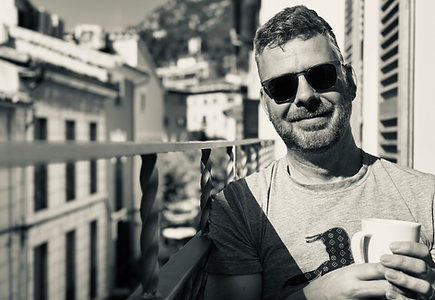A Videographic Criticism
In Search of a Father
2024
In Search of a Father is an auto-ethnographic video essay that examines representations of fatherhood on film and television. The project explores how ideas of the father and fatherhood are shaped by popular culture and in turn shape the way that society understands paternal responsibility.
ABOUT

I am Simon Stanton-Sharma and I am a Lecturer in Film and Television Production at the University of Salford and stream leader for the MA in Drama Production for TV and Film. I am an award-winning filmmaker and television director with over twenty years of experience across scripted content, commercials, entertainment, and current affairs, primarily at the BBC. In 2017, I dedicated two years to launching the BBC’s new Africa service in Kenya, Nigeria, and Senegal. Over the last seven years, served as a director of Newsnight on BBC 2.
My research interests focus on South African modernism and the decolonization of educational practices. I have directed several notable short films, including All That Is Buried and You Can't Get Lost in Joburg, both of which examine the socio-political landscapes of South Africa and have been featured in multiple film festivals. Through my work, I seek to highlight underrepresented voices and challenge conventional narratives in media. My ongoing research and creative projects reflect a dedication to exploring the complexities of culture and identity in contemporary society including a piece of videographic criticism on media representations of fatherhood which was completed in October 2024.
Early 2023 marked a transformative period for me. At 46, I was grappling with a new, profound identity. Up until then, the idea of being a father had been more of a philosophical notion, detached from reality. But with two tiny humans soon to arrive, this abstract concept was on the verge of becoming intensely real. Many of my friends had faced their own fatherhood journeys, seeking to avoid the flaws they’d experienced with their fathers. I, however, grew up without a father, which left me with a different set of questions: What would this new role look like for me? And more urgently, what does it even mean to be a father?
Despite decades in film—both creating it and teaching about it—I found myself searching for an answer to the question: what does a father actually look like? Popular culture is awash with depictions of fathers, yet truly inspiring or relatable father figures feel surprisingly scarce. The video essay I created begins with this very question, diving into an expansive exploration of fatherhood across 70 film and television representations. Each portrayal reflects different cultural expectations, giving us a mosaic of fatherly archetypes from stern breadwinners to bumbling fools.
Through these cinematic dads, my work engages with some of the key historical, psychological, and cultural debates around fatherhood. The documentary brings in voices of experts like Adrienne Burgess, CEO of the Fatherhood Institute, who points out the seismic gap between private and public fatherhood. Burgess argues that real-life fathers, actively involved and emotionally present, rarely appear on screen in ways that reflect their lived realities. Toby Reynolds, author of The American Father Onscreen, adds that contemporary Hollywood often depicts fathers as struggling and under pressure, hinting at an invisible burden that many men shoulder behind closed doors. Meanwhile, Keiran Anders from Dad Matters argues that modern dads, expected to be more hands-on than ever, confront a media landscape that’s still saturated with outdated stereotypes, while societal, legal, and medical structures do little to support them. These experts underscore the need for a more nuanced portrayal of fathers—something sorely lacking in mainstream film and television. When fathers aren’t sex symbols, they’re caricatured as detached authoritarians or clumsy fools. But in real life, fathers play complex, evolving roles.
The essay also delves into the historical shifts that have shaped these cultural expectations. Stephen Williams, a sociologist, outlines four dominant paradigms of fatherhood over the past century: the breadwinner, the moral teacher, the role model, and the nurturer. In film, these roles play out in ways that mirror societal changes and tensions. In her book Bringing Up The Daddy, Stella Bruzzi traces these cinematic fathers, especially those caught between the traditional breadwinner archetype and the emotionally supportive dad. Through these varied portrayals, we see how changing norms of masculinity and caregiving impact our views of fatherhood.
Despite some progress in cultural representations, gender roles within families are still evolving slowly. While expectations of fathers are changing, real-life support hasn’t kept pace. The UK, for instance, has some of the most restrictive paternity leave policies in Europe, with nearly half of businesses offering only the legal minimum, according to a recent CIPD report. Fathers may want to be more engaged, but institutional and cultural frameworks often work against them.
In In Search of a Father, I argue that the way we depict fathers shapes not only societal expectations but also real-life fatherhood experiences. The portrayals we consume become lenses through which we interpret and build our own relationships. The essay concludes with a call for richer, more realistic representations of fathers—representations that reflect both the challenges and the evolving expectations of modern fatherhood.
CONTACT
Get in touch




